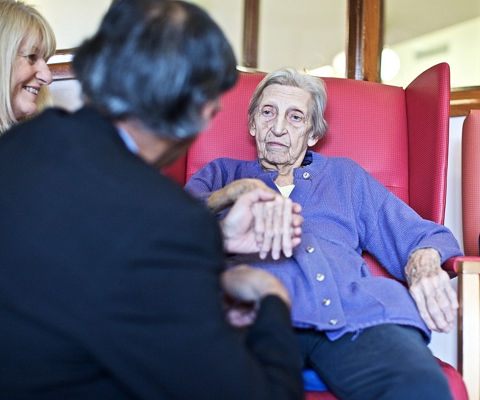Leadership in Transforming Dementia Care for Medical Doctors



This session will introduce you to the key policy drivers and evidence base that inform high quality, compassionate, person-centred care practices. It will help you to understand how you can use leadership skills to work collaboratively with your colleagues to implement evidence-based practice and maintain a high level of care quality.
Learning Objectives
By the end of this session you will be able to:
- Identify the key drivers and sources of evidence that influence dementia care
- Promote the use of evidence in planning and delivering care
- Describe the importance of key leadership skills for ensuring quality, improving services and providing staff training and support
- Describe the importance of collaborative working and equality and diversity when working with different agencies and individuals
In this session, we will reflect on the roles and responsibilities of leaders and managers and the key drivers and evidence base which can inform these roles.
This session has been mapped to the Dementia Training Standards Framework and is designed to support the Dementia Action Alliance Dementia Statements.
Before commencing this session you may wish to complete:
- Module 1 – Introduction to Living with Dementia/Dementia Awareness (407-0030)
Lindsey is a Senior Dementia Care Practice Development Consultant and Trainer within the Centre for Applied Dementia Studies at the University of Bradford. Her role involves developing and delivering face-to-face and cascade training to health and social care organisations throughout the UK and internationally. Lindsey leads the delivery of training in Dementia Care Mapping for Realising Person Centred Care; Dementia Care Mapping for Leading Practice Change; and the Short Observational Framework for Inspection, which is used by health and social care inspectors internationally.
Her areas of special interest include promoting effective and meaningful person-centred communication and supporting people living with dementia who experience complex eating and drinking difficulties, particularly at the end of life. Lindsey is an Alzheimer's Society Clinical Training Fellow conducting a PhD to explore the eating and drinking experiences of people living with dementia and swallowing difficulties in care homes. She completed her MSc in Dementia Studies in 2012 and joined the Centre for Applied Dementia Studies at the University of Bradford in October 2013.
A registered speech and language therapist she has worked in a variety of settings, including acute hospitals, mental health hospitals, care homes, day centres and in people's own homes. She has been responsible for developing and embedding specialist speech and language therapy services within several NHS Mental Health Trusts in England. Since 2006, Lindsey has specialised in dementia care practice. Lindsey maintains strong links with the field of speech and language therapy to maintain her clinical knowledge and skills. She is regularly invited to give keynote lectures.

- 03_06_10 ECG III
- Posted By eIntegrity Healthcare e-Learning
- Posted Date: 2024-11-02
- Location:Online
- This third and final session about the ECG discusses cardiac conduction and arrhythmias.
- 03_06_09 ECG II
- Posted By eIntegrity Healthcare e-Learning
- Posted Date: 2024-11-02
- Location:Online
- This session follows on from ECG I and presents the ECG as an electrical map of the heart. It details the abnormalities expected with myocardial infarction and left ventricular hypertrophy.
- 03_06_08 ECG 1
- Posted By eIntegrity Healthcare e-Learning
- Posted Date: 2024-11-02
- Location:Online
- This session explains how to record an ECG, the structure of the ECG and how to interpret the results. It further explains the use of the ECG in clinical practice.
- 03_06_07 Pulmonary function test interpretation
- Posted By eIntegrity Healthcare e-Learning
- Posted Date: 2024-11-02
- Location:Online
- This session will describe some of the basic respiratory investigations, and explain the relevance of the results obtained.
- 03_06_06 An alternative approach to acid-base abno...
- Posted By eIntegrity Healthcare e-Learning
- Posted Date: 2024-11-02
- Location:Online
- This session contains a link to the BJA Education article followed by a series of self assessment multiple choice questions.<br><br>The article will open in a new window or tab depending on your browser.<br><br> CPD credits are awarded by the RCoA for the







